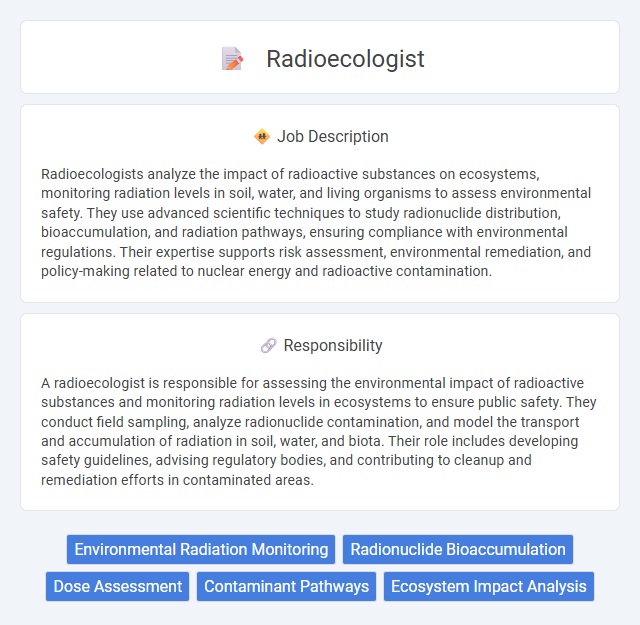
Radioecologists analyze the impact of radioactive substances on ecosystems, monitoring radiation levels in soil, water, and living organisms to assess environmental safety. They use advanced scientific techniques to study radionuclide distribution, bioaccumulation, and radiation pathways, ensuring compliance with environmental regulations. Their expertise supports risk assessment, environmental remediation, and policy-making related to nuclear energy and radioactive contamination.
Individuals with strong analytical skills and a background in environmental science or biology are likely suitable for a radioecologist job. Those who can handle complex data and have an interest in studying the effects of radiation on ecosystems might find this career rewarding. Candidates who prefer outdoor fieldwork and working in multidisciplinary teams are probably well-suited for this role.
Qualification
Radioecologists need a strong background in environmental science, radiochemistry, or biology, often supported by a bachelor's or master's degree in related fields. Expertise in radiation measurement techniques, ecological modeling, and data analysis is crucial for assessing radioactive contamination impact on ecosystems. Proficiency with regulatory standards and experience in field sampling and laboratory research further enhance a radioecologist's qualifications.
Responsibility
A radioecologist is responsible for assessing the environmental impact of radioactive substances and monitoring radiation levels in ecosystems to ensure public safety. They conduct field sampling, analyze radionuclide contamination, and model the transport and accumulation of radiation in soil, water, and biota. Their role includes developing safety guidelines, advising regulatory bodies, and contributing to cleanup and remediation efforts in contaminated areas.
Benefit
The role of a radioecologist likely offers significant benefits, including opportunities to contribute to environmental protection and public health by assessing radiation impacts on ecosystems. Professionals in this field probably gain access to advanced scientific tools and collaborative research projects, enhancing their technical expertise and career development. Employment in radioecology may also provide job stability due to increasing demand for radiation monitoring and environmental safety assessments.
Challenge
Radioecologists likely face complex challenges involving the assessment and management of radioactive contamination in diverse ecosystems. Their work probably requires balancing accurate environmental monitoring with evolving regulatory standards and technological advancements. The unpredictable nature of radiation effects on living organisms may demand continuous problem-solving and adaptation.
Career Advancement
A career as a radioecologist offers opportunities for advancement through specialized research in environmental radioactivity, nuclear safety, and radiological impact assessment. Progression often involves leading multidisciplinary projects, securing funded research grants, and publishing in scientific journals, which enhances professional recognition. Advanced roles include senior research scientist, environmental consultant, and academic professor, each requiring expertise in radiological data analysis and regulatory compliance.
Key Terms
Environmental Radiation Monitoring
Radioecologists specializing in Environmental Radiation Monitoring assess and measure radiation levels in soil, water, and air to evaluate environmental contamination and its impact on ecosystems. They use advanced detection instruments and data analysis techniques to track radioactive isotopes and ensure compliance with safety regulations. Their work supports risk assessment, environmental protection, and public health by providing critical information on radiation exposure in natural and urban environments.
Radionuclide Bioaccumulation
Radioecologists specialize in studying radionuclide bioaccumulation to assess the movement and concentration of radioactive substances within ecosystems. They analyze the uptake, retention, and transfer of radionuclides in flora, fauna, and soil to determine environmental and health risks. Expertise in radiochemistry, ecological modeling, and environmental monitoring tools is essential for evaluating contamination levels and developing mitigation strategies.
Dose Assessment
A Radioecologist specializing in dose assessment evaluates the impact of radioactive substances on ecosystems and human health by quantifying radiation exposure levels. They utilize environmental sampling, modeling techniques, and regulatory standards to estimate absorbed doses in flora, fauna, and humans. Their expertise supports risk assessment, environmental protection policies, and radiation safety guidelines in contaminated areas.
Contaminant Pathways
Radioecologists specialize in studying contaminant pathways to understand the movement and accumulation of radioactive substances in ecosystems. They analyze soil, water, air, and biota samples to track radionuclide dispersion and assess environmental risks. This expertise supports the development of remediation strategies and regulatory policies to protect human health and biodiversity.
Ecosystem Impact Analysis
Radioecologists analyze the impact of radioactive substances on ecosystems, assessing contamination levels and their effects on flora, fauna, and soil quality. They utilize advanced modeling techniques to predict the spread and long-term ecological consequences of radiation exposure. Their expertise supports environmental protection agencies in developing safety guidelines and remediation strategies to mitigate radioactive contamination.
 kuljobs.com
kuljobs.com